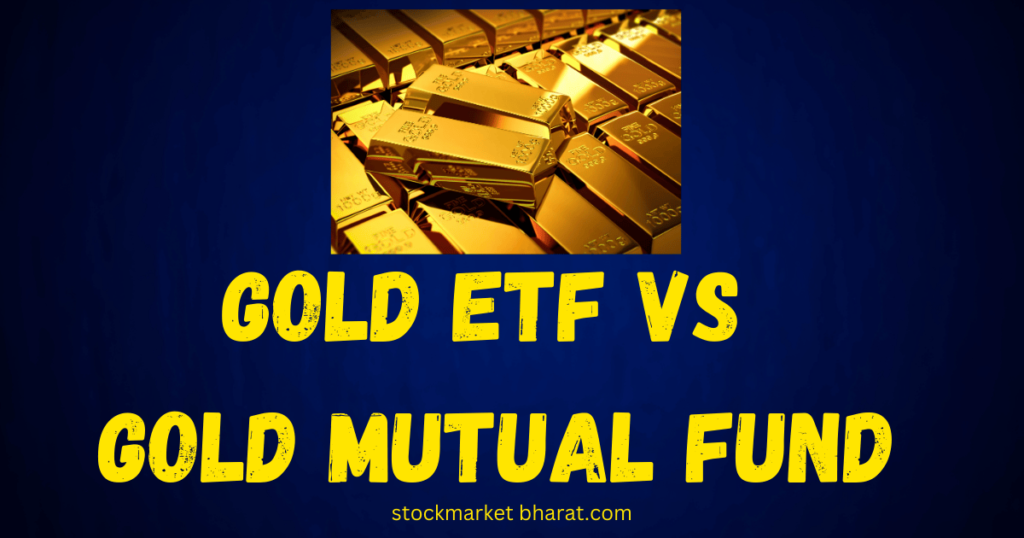Gold ETF vs Gold Mutual Fund
Investors looking to gain exposure to gold have multiple options, including Gold ETFs (Exchange-Traded Funds) and Gold Mutual Funds. Both are popular investment instruments that allow investors to benefit from gold price movements without physically holding the metal. However, these instruments differ in structure, costs, and investment strategy. Understanding the differences between Gold ETFs and Gold Mutual Funds is essential for making an informed investment decision.

What is a Gold ETF?
A Gold ETF is an exchange-traded fund that invests in physical gold and tracks gold prices. Gold ETFs are traded on stock exchanges, just like stocks, and provide a simple way to invest in gold without dealing with storage and security concerns.
Features of Gold ETFs:
- Traded on stock exchanges like NSE and BSE.
- Backed by physical gold, ensuring transparency and security.
- High liquidity, allowing investors to buy and sell at market prices during trading hours.
- Lower expense ratio compared to gold mutual funds.
- No exit load, making them more cost-effective.
What is a Gold Mutual Fund?
A Gold Mutual Fund is a type of mutual fund that primarily invests in Gold ETFs or gold-related assets. These funds are managed by professional fund managers and provide indirect exposure to gold.
Features of Gold Mutual Funds:
- No need for a Demat account, making them accessible to all investors.
- Professionally managed, with fund managers making investment decisions.
- Higher expense ratio due to fund management fees.
- Systematic Investment Plan (SIP) option, allowing disciplined investment over time.
Key Differences: Gold ETF vs Gold Mutual Fund
| Feature | Gold ETF | Gold Mutual Fund |
|---|---|---|
| Investment Mode | Directly in gold | Indirectly via Gold ETFs |
| Trading | Listed on stock exchanges | Bought/sold via AMC |
| Demat Account | Required | Not required |
| Liquidity | High | Moderate |
| Expense Ratio | Lower | Higher |
| SIP Option | Not available | Available |
| Exit Load | No exit load | May have exit load |
Which is Better: Gold ETF or Gold Mutual Fund?
The choice between a Gold ETF and a Gold Mutual Fund depends on an investor’s financial goals, risk appetite, and investment preferences.
Gold ETFs are Ideal for:
- Investors who have a Demat account and are comfortable trading on stock exchanges.
- Those who want lower costs and higher liquidity.
- Investors seeking real-time price tracking and direct exposure to gold.
Gold Mutual Funds are Suitable for:
- Investors without a Demat account who prefer mutual fund investments.
- Those looking for SIP options to invest in gold systematically.
- Investors who prefer professional fund management.
Taxation on Gold ETFs and Gold Mutual Funds
Tax treatment is another crucial factor when comparing these two instruments.
- Gold ETFs and Gold Mutual Funds are taxed as per capital gains taxation rules.
- If held for less than 3 years, gains are treated as short-term capital gains (STCG) and taxed as per the investor’s income tax slab.
- If held for more than 3 years, gains are taxed as long-term capital gains (LTCG) at 20% with indexation benefits.
Gold Investment as a Hedge Against Inflation
Gold has always been considered a safe-haven asset and a hedge against inflation. Both Gold ETFs and Gold Mutual Funds offer convenient ways to invest in gold without the hassle of physical storage.
Conclusion
Both Gold ETFs and Gold Mutual Funds have their unique advantages and disadvantages. Gold ETFs are more cost-effective and liquid, making them ideal for active traders and investors seeking direct exposure. On the other hand, Gold Mutual Funds provide the benefit of SIP investments and professional management, making them suitable for long-term investors.
Investors should assess their risk tolerance, investment horizon, and financial goals before deciding between Gold ETFs and Gold Mutual Funds. Diversifying a portfolio with gold investments can provide stability and act as a hedge against market fluctuations.
Disclaimer: This article is for informational purposes only. Investors should consult a SEBI-registered financial advisor before making investment decisions.
WORTH A READ:portfolio-perfomance-evaluation-method